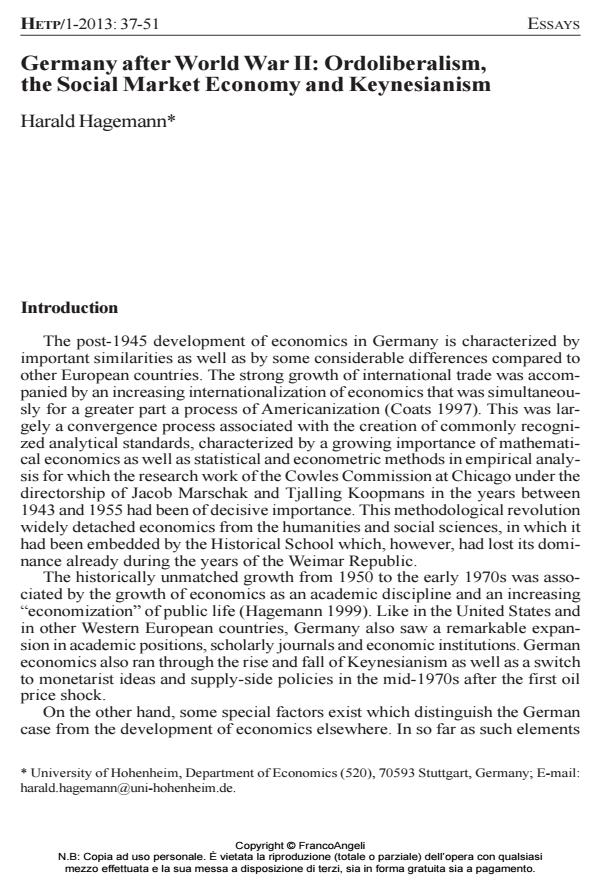Germany after World War II: Ordoliberalism, the Social Market Economy and Keynesianism
Journal title HISTORY OF ECONOMIC THOUGHT AND POLICY
Author/s Harald Hagemann
Publishing Year 2013 Issue 2013/1
Language English Pages 15 P. 37-51 File size 97 KB
DOI 10.3280/SPE2013-001003
DOI is like a bar code for intellectual property: to have more infomation
click here
Below, you can see the article first page
If you want to buy this article in PDF format, you can do it, following the instructions to buy download credits

FrancoAngeli is member of Publishers International Linking Association, Inc (PILA), a not-for-profit association which run the CrossRef service enabling links to and from online scholarly content.
The post-1945 development of economics in Germany is characterized by important similarities as well as by some considerable differences compared to other European countries. The strong growth of international trade was accompanied by an increasing internationalization of economics that was simultaneously for a greater part a process of Americanization. The historically unmatched growth from 1950 to the early 1970s was associated by the growth of economics as an academic discipline and an increasing "economization" of public life. German economics also ran through the rise and fall of Keynesianism as well as a switch to monetarist ideas and supply-side policies in the mid- 1970s after the first oil price shock. On the other hand, some special factors exist which distinguish the German case from the development of economics elsewhere.The paper illustrates the relationship between the political and the economic sphere in Germany after WWII
Keywords: Freiburg School, Keynesianism, Ordoliberalism, Social Market Economy
Jel codes: A11, B29
- Banks, Intermediation and the Endogenous Nature of Money Supply. A Note on the Contributions of Erich Schneider and Augusto Graziani Stefano Figuera, Andrea Pacella, in Review of Political Economy /2025 pp.1
DOI: 10.1080/09538259.2025.2496715 - Wilhelm Röpke (1899–1966) Raphaël Fèvre, pp.109 (ISBN:978-3-319-68356-0)
- Ordoliberalizmden Günümüze Sosyal Piyasa Ekonomisi: Bir Üçüncü Yol Arayışı Ahmet Gedik, in Sosyal ve Kültürel Araştırmalar Dergisi (SKAD) /2025 pp.72
DOI: 10.25306/skad.1687509 - The Societal Crisis of the Presentt as a Neoliberal Leitmotif Manuel WWrsddrfer, in SSRN Electronic Journal /2014
DOI: 10.2139/ssrn.2510968 - Le marché sans pouvoir : au cœur du discours ordolibéral Raphaël Fèvre, in Revue d'économie politique /2017 pp.119
DOI: 10.3917/redp.271.0119 - Political Economy and International Order in Interwar Europe Raphaël Fèvre, pp.25 (ISBN:978-3-030-47101-9)
- Walter Eucken, entre économie et politique Patricia Commun, Raphaël Fèvre, pp.111 (ISBN:979-10-362-0177-6)
- The renaissance of ordoliberalism in the 1970s and 1980s* Tim Krieger, Daniel Nientiedt, in Constitutional Political Economy /2025 pp.408
DOI: 10.1007/s10602-023-09411-2 - Origins and Change of the Social Market Economy Günther Chaloupek, pp.47 (ISBN:978-3-031-39209-2)
- The Age of Fragmentation Alessandro Roncaglia, (ISBN:9781108777766)
- Post-war Keynesianism in Germany and Western Europe Günther Chaloupek, Hans A. Frambach, pp.1 (ISBN:978-3-032-00497-0)
Harald Hagemann, Germany after World War II: Ordoliberalism, the Social Market Economy and Keynesianism in "HISTORY OF ECONOMIC THOUGHT AND POLICY" 1/2013, pp 37-51, DOI: 10.3280/SPE2013-001003